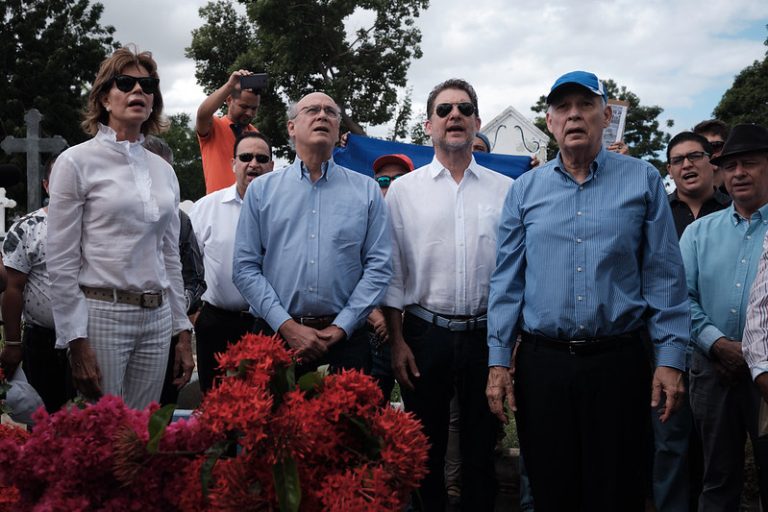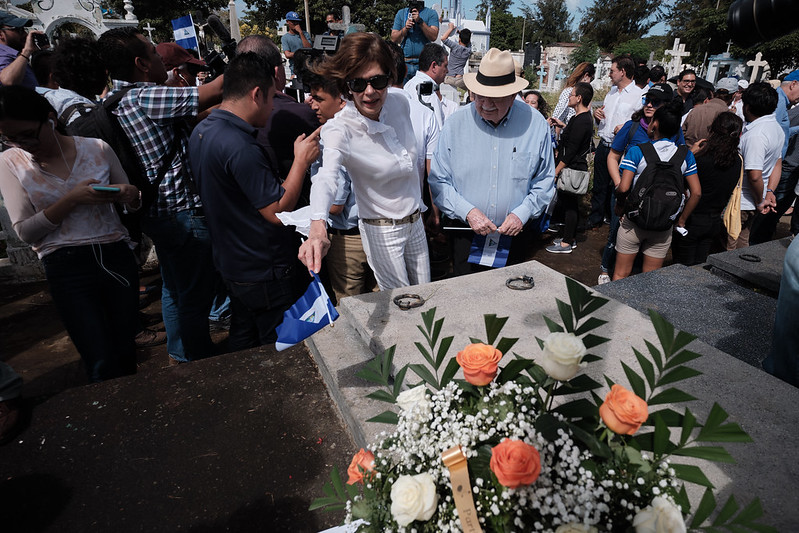15 de enero 2020

Children of Exile: The Births “Sowing Hope” in the Camp of Nicaraguan Farmers

PUBLICIDAD 1M
PUBLICIDAD 4D
PUBLICIDAD 5D
Tribute to the martyr of public liberties, while the Ortega Murillo regime’s police besieges the central cemetery

“Public liberties can’t be killed,” read the banner carried by the children of the Martyr of Public Liberties, Pedro Joaquin Chamorro (PJCH), on January 10, when they went to Managua’s Central Cemetery to pay tribute on the 42nd anniversary of the assassination of the historical director of newspaper La Prensa.
The commemoration and phrase were revived with present-day Nicaragua marked by a de facto police state of siege ordered by the regime of Daniel Ortega and Rosario Murillo, the same that annulled most constitutional rights since September 2018.
In fact, while the relatives of Dr. Pedro Joaquin Chamorro placed a wreath on the tomb—along with citizens, members of the Civic Alliance for Justice and Democracy, the Blue and White National Unity, and other groups—riot police patrols besieged at the gates of the cemetery.
It was a brief gathering, but impregnated with solemnity before the tomb of the National Hero, on which an elongated cross is raised. A man, carrying vegetables and a few pounds of chicken that he has just bought at the market located in front of the cemetery, sang the Ave Maria. Immediately after, the National Hymn was sung.
“Long Live Free Nicaragua!” Nicaragua will be a Republic again!” Shouted the participants. The two slogans join two periods marked by two dictatorships: Ortega’s and Somoza’s. In both cases public liberties —and especially freedom of the press— have been and are constrained.
“Today marks 42 years since my father shed his blood for democracy and freedom in Nicaragua. It is important that we all remember his thoughts and his struggle for democracy in Nicaragua that, day by day, has greater validity at the moment,” said Pedro Joaquin Chamorro Barrios, the eldest son of the Martyr of Public Liberties and former president Violeta Barrios de Chamorro.
Pedro Joaquin Chamorro was assassinated by the Somoza dictatorship on January 10, 1978. The assassination meant a watershed in Nicaragua because it provoked an outbreak of popular protest, insurrectional struggle and general strike, which were the final stretch for the overthrow of the Somoza dictatorship.
From La Prensa newspaper, Pedro Joaquin Chamorro raised the banner of democratization of the country, to the point that the newspaper was called by its co-director and poet, Pablo Antonio Cuadra: “The Paper Republic.”
Forty-two years after his murder, Pedro Joaquin Chamorro’s La Prensa continues to resist the onslaughts of authoritarian regimes. At present, the newspaper still maintains its printed edition —each time thinner of pages— due to the customs blockade on newsprint imposed by the Ortega Murillo dictatorship that has lasted more than 71 weeks.
“We are at the minimum we can. We are trying to last as long as possible because, I think that, if La Prensa closes, even if we stay on the internet, it will be a blow to Nicaragua’s freedom and for the struggle that so many people are fighting,” said Jaime Chamorro Cardenal, director of the newspaper and brother of Pedro Joaquin. “It’s important to be alive. The newspaper is our banner. It means too much,” he assessed.
Freedom of the press, the most harassed
Cristiana Chamorro, daughter of the National Hero and president of the Violeta Barrios de Chamorro Foundation, said that given the trampling of public liberties, freedom of the press is the most harassed.

Cristina Chamorro places a wreath on the tomb of her father, Pedro Joaquin Chamorro. Carlos Herrera / Confidencial
“This date, and every day, he reminds us that we have a mission with Nicaragua. He left us a clear legacy, a path, which we have to fight for,” assured Cristiana Chamorro. “At present, there has been a tremendous escalation of repression and it is stronger than ever. But, on the other hand, we see and value all this effort by independent journalists who have placed themselves in the front row and has not been defeated: those who went into exile, those who are putting their security at risk for the truth. Digital media outlets have grown. Ortega’s repression, to some extent, has been defeated by Nicaraguans who exercise their public freedoms,” she added.
National Unity
Edmundo Jarquin, collaborator of Pedro Joaquin Chamorro at the Democratic Liberation Union (UDEL), was one of the last to meet with the director of La Prensa prior to his martyrdom. The day before the murder, on January 9, Chamorro discussed with Jarquin and other members of the Democratic Liberation Union (UDEL) a possible dialogue with the “tercerista” (third-way) tendency of the FSLN.
“The assassination of Pedro Joaquin caused not only the final insurrection against the Somoza dictatorship but a great national unity. Something similar happened with the 2018 April massacre, which provoked a great national unity. I think that we are beginning to see the light at the end of the tunnel, because Ortega does not have the capacity to overcome the political crisis except by abandoning the government,” Jarquin compared.
Lesther Aleman, student leader and member of the Civic Alliance, regretted that in “Nicaragua blood has to be shed in order to generate a rebellion like the one that happened in 1978.” “Forty-two years after the death of Pedro Joaquin, today we are honoring the memory of Angel Gahona, who was killed for the same dream: freedom of the press. For us it is to materialize the dream that Nicaragua will be a Republic again. To fight for our freedoms, in order to have democracy and have justice that we need so much,” said Aleman.
“Confiscated but not crushed”
Carlos Fernando Chamorro, director of Confidencial and son of the Martyr of Public Liberties, said that although the media outlet he directs, like the channel 100% Noticias of Miguel Mora, remain confiscated, “we have not been crushed.”
“Journalists continue. We do not accept censorship and self-censorship. And because the citizens that use cellphones like you (journalists) are exercising freedom of expression, that is one of the factors that have defeated the dictatorship along with the political prisoners,” says the director of Confidencial.
“My father was a political prisoner and was never broken in prison, and the political prisoners of the Ortega dictatorship were not broken either. There is a moral and political defeat that has to do with that validity of freedoms.”
Archivado como:
PUBLICIDAD 3M
Periodista. Destaca en cobertura a violaciones de derechos humanos: desplazamiento forzado, tráfico ilegal en territorios indígenas, medio ambiente, conflictos mineros y ejecuciones extrajudiciales. Premio Iberoamericano Rey de España 2018.
PUBLICIDAD 3D